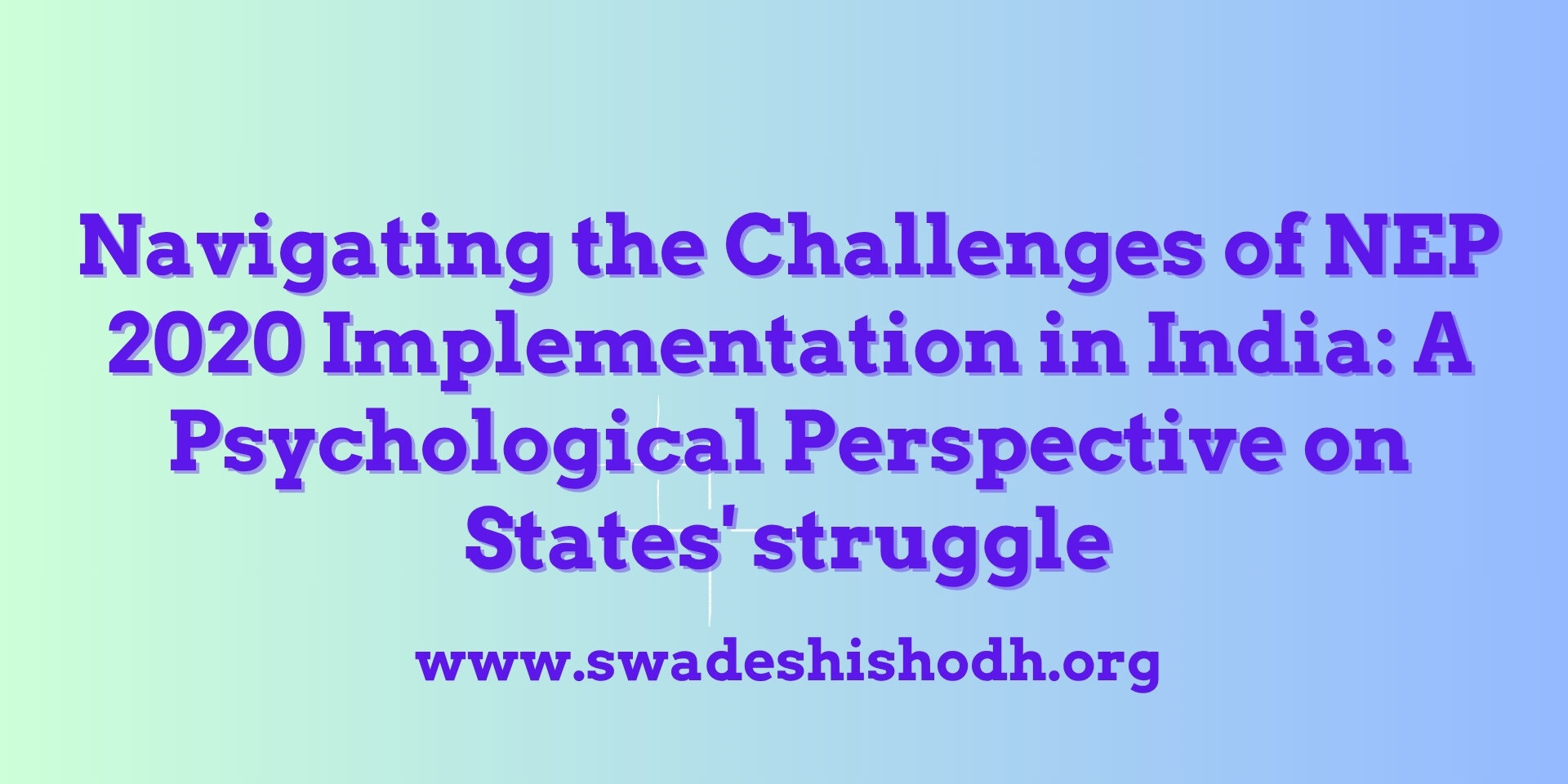Navigating the Challenges of NEP 2020 Implementation in India: A Psychological Perspective on States’ struggle
Dr.M.Palaninatha Raja, Dean Quality Assurance, SRMIST Kattankulathur (PO) 603203
Preamble:
The Government of India has introduced the National Education Policy (NEP) 2020 after several decades, with an objective to reorient the education system by providing overall multidisciplinary, flexible and inclusive learning. While the policy has accepted and support in various states, its implementation has faced significant challenges, particularly in states that have expressed opposition. This article highlights the challenges through the perspective of educational psychology, focusing on the societal impacts and further on students, teachers, and educational administrators in states that have partially or not implemented the NEP.
Introduction:
The NEP 2020 after a careful deliberation comes out with a transformative educational system, emphasizing Critical thinking, Communication, Creativity and Collaboration (4C) and the use of mother tongue as vernacular medium of instruction till certain standard of study. However, its implementation has serious concerns in certain states, leading to a disturbed educational landscape. However, the psychological implications of this resistance, is crucial for addressing the barriers to be an accommodative NEP adoption.
Psychological Challenges in Non- NEP accepting States: Cognitive Dissonance Among Teachers:
Dissonance refers to a psychological discomfort to the human beings that reveals that there is a difference of opinion in beliefs, expectations and experiences. Educational administrators in states resisting the NEP often experience cognitive dissonance, a psychological state where new information conflicts with existing beliefs. This dissonance can lead to stress, reduced job satisfaction, and resistance to adopting new pedagogical methodologies. For instance, teachers practiced to traditional teaching and learning may find it inconvenient to move from their comfort zone to the shift in new pedagogical approaches, say interdisciplinary and devoted experiential learning.
Anxiety and Uncertainty in Teacher and Students:
Teacher and students in non- NEP accepting states may experience anxiety due to the lack of clarity regarding new curriculum design changes, content delivery methods, assessment procedures and future academic and career pathways. This uncertainty can affect both faculty and student motivation, self-esteem and overall mental well- being. The introduction of new languages or subjects without adequate preparation will further intensify these feelings.
Identity Preservation:
In states with strong regional identities, such as Tamil Nadu and West Bengal, the NEP’s emphasis on Hindi and Sanskrit has been perceived as an imposition on local languages and cultures. This perception has led to psychological reactance, where individuals resist changes perceived as threats to their autonomy and cultural identity.
Status Quo and Implementation Gaps:
Despite the NEP’s objectives, several states have not fully embraced its provisions:
· Curriculum and Pedagogical Resistance:
States like Tamil Nadu and West Bengal have maintained their Conventional educational structures and curricula, resisting the NEP’s proposed model and competing NEP, they are in the process of evolving State Education Policy (SEP). This conflict has led to a lack of alignment between state and national educational standards, creating confusion among students and teachers.
· Inadequate Teacher Training:
The NEP emphasizes continuous training and development for teachers. However, in non- NEP accepting states, there has been insufficient financial support in training programs, leading to a workforce unprepared to implement the different novel pedagogical approaches in the modern context.
· Infrastructure Deficiencies:
The NEPs main focus is digital transformative learning and infrastructure development has not been properly planned for implementation in certain states. In states with limited resources, the lack of digital infrastructure impedes the classroom efficiency and envisioned the indifferent educational experiences.
Psychological Implications for Stakeholders:
- Students:
The inconsistency in new and traditional pedagogical practices and approaches across states will disturb the achieved access and equity among students. This disparity will reflect in their academic performance and future opportunities, contributing to a sense of injustice and frustration.
· Teachers:
Teachers in non-NEP accepting states may experience mental stagnation due to the lack of alignment between their training and development and the NEP’s requirements. This misalignment can lead to decreased job satisfaction and a sense of professional incompetency.
· Educational Administrators:
The perception about NEP at the state level will enhance the educational divide between national goals and regional priorities/realities. Administrators will face challenges in inconsistent educational norms, leading to differentiated policy implementation and governance complexities.
Recommendations:
Contextual Teacher Training:
Structure and develop a framework for Teacher training and development programs customised to the required needs and context specific of teachers in various states, focusing on the ground reality and real application of the NEP’s pedagogical approaches.
Inclusive Implementation:
Involve and accommodate the state government authorities, teachers, bureaucrats and communities in the implementation process to ensure that the NEP accommodates regional languages, cultures and educational traditions.
Digital Infrastructure Development:
Financially, invest in building equitable educational infrastructure which include digital infrastructure, particularly in rural and remote areas, to facilitate the digital and physical resources required for NEP implementation.
Psychological Support Systems:
Establish counselling and support services for students and teachers to address the psychological challenges arising from the transition to new educational paradigms.
Conclusion:
The successful implementation of NEP 2020 necessitates a nuanced understanding of the psychological dynamics at play, especially in states that have expressed their concerns and conflicts. By addressing the cognitive, emotional, and social factors influencing stakeholders, administrators will certainly lead an environment conducive to the NEP goals, thereby more inclusive and effective education system across India.






